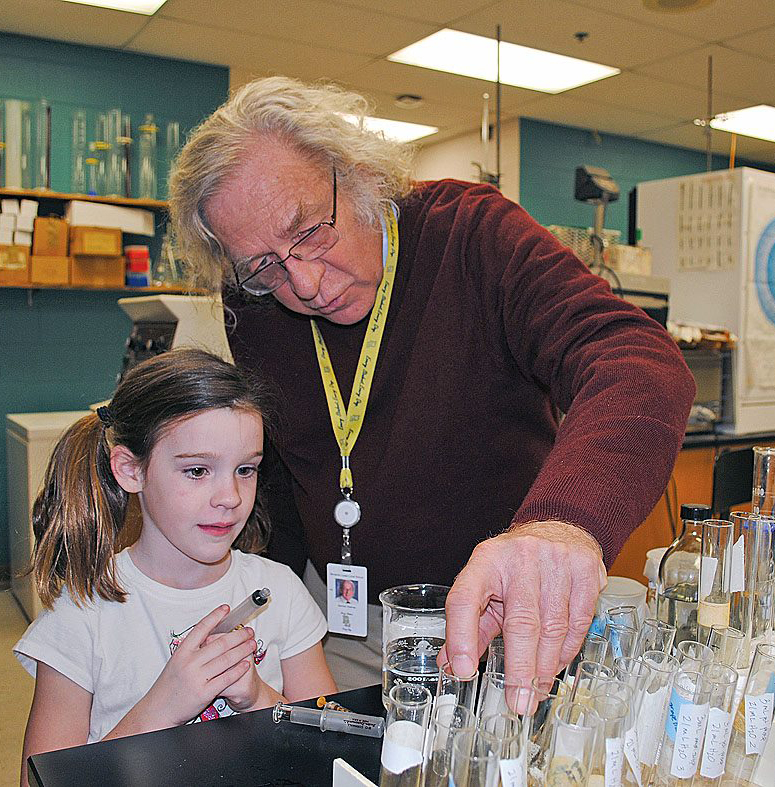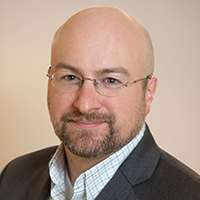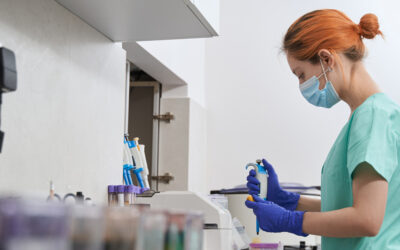Our professional careers are the result of careful planning, hard work and some luck. We all recognize influential people in our past that have contributed positively to our career choice and successes. I have been fortunate to have multiple career advisers, however, my earliest and most important mentor was a high school teacher named Spencer Reames.
At the time, Mr. Reames was an instructor of a number of biology courses including microbiology. I recall being amazed at the prevalence of microorganisms in our environment and that bacteria were both harmful and beneficial. My interest in genetically manipulating microbes to understand and influence their physiology led me to pursue a microbiology degree in college, and from there I was on my way to an exciting career.
I am certain that many scientists can trace their own career choices to influential teachers that ignited a passion for scientific discovery and critical thinking. In recognition of National Teacher Appreciation Week (#ThankATeacher), I thought it fitting to interview my high school microbiology teacher and ask how his perspective on early science education has evolved over 49 years of service.

Mr. Reames with a future scientist. Photo credit: Dan Robinson, Kenton Times
BB: How many students have you taught over your 49 year career?
SR: I believe that I have had around 3,500 students during that time.
BB: What motivates you to keep teaching?
SR: At this point, I cannot picture myself not teaching and working with students. This year, I have a freshman that I am working with on his science project. He told me that he wants to take one of my classes because he would be the third generation in his family to have classes under me. In the past, I have had students ask me not to retire until they graduate. These are usually the students doing research projects.
Getting to 50 years of teaching is also motivating. I believe I will have taught the longest of any Benjamin Logan teacher. My greatest motivation is working with the students and helping them be successful.
BB: How did you get your start in biology? What led you to a career as a biology teacher?
SR: My start in biology came at a very young age. When I was a child, I spent a lot of time outdoors. I collected insects, rocks and crayfish. I had a group that I went exploring with. We would make sandwiches, get a canteen of water, back pack, jars and minnow buckets and head to a stream to explore. It was great fun and I remember some of those events as if they happened yesterday. I loved observing and collecting during these trips.
Even though I lived in town I raised rabbits, had a rooster and trained a pigeon during my childhood. During grade 8, I had Mr. Marmon for Ohio history and science. I admired him a great deal, and because of his inspiration I decided I wanted to teach science or history. I was lucky to have great science teachers while in high school and that stimulated me to continue with my dreams of being a teacher.
BB: How have advancements in technology impacted how students learn in biology classes?
SR: Technology is not a silver bullet for education, but it is a tool that opens whole new worlds to students. For instance, we were talking about retinal diseases in genetics and some questions came up. We went to the Mendelian Inheritance in Man site and checked out what was known about some of the diseases. This could not have happened a few years ago.
However, not everything is open to students over the internet. Many journal articles are not available without paying an exorbitant amount because we do not belong to a service which allows us to search journals. In general, there is ready access to a great deal of information that has not been available to students in the past.
BB: Have you noticed a change in students’ interests related to biology (e.g. interest in forensics from popular TV shows)?
SR: Yes, popular culture does influence student interests. Due to TV programs, many high schools have started forensic science classes. We are going to have such a class for the first time in our school next year. The CRISPR experiment that we did was in part the result of readings done in class and the interest that students showed. You also see these trends in science fair projects in that you often see projects that relate to hot topics in the news.
BB: How have the advancements made in the field of biology changed how you teach over the years?
SR: When I started teaching biology just about every teacher had their students do a number of dissections in order to look at different phylogenetic groups. With the exception of the anatomy and physiology class, I have not had students do dissections for a number of years. If we wish to show relationships between groups, we use protein electrophoresis to look at protein patterns or isozymes.
Instead of talking about DNA we extract it, do restriction fragment analysis and transformations. Just recently we did a CRISPR experiment in which the students edited a protein on one of the ribosome subunits. The way biology is taught today has changed significantly since I started teaching. The changes in teaching are as amazing as the advancements in science.
BB: What is your philosophy/approach to engaging and motivating students?
SR: I try to find out what the students are interested in and relate what we are doing to that. I also try to relate topics to what is currently happening in the world. The CRISPR experiment that we did came about as the result of discussions on what is happening in the research world. Whenever possible, I like the students to do laboratory activities since this helps them tie pieces of the puzzle and concepts together.
I also like to acknowledge improvement. In some cases students struggle in a class and when they make advancements and improvements, that needs to be acknowledged. This often motivates students to continue working hard.
BB: I remember you encouraging your students to conduct hands-on, student designed experiments for science fairs and other projects. Why do you think this is a valuable approach?
SR: I think the projects are very important learning and teaching opportunities. The projects help students understand how new knowledge is gained and that it is not always a direct route from a question to a result. They learn to question approaches taken and the results obtained.
Students often learn what they are really interested in and what career areas they want to pursue. A large number of the students that really got into their projects have gone on to have careers in science or medicine. A few years ago one of my colleagues asked a senior what she thought was her most important experience in high school and she said it was working on her project in the lab. When she was asked why, she told him that it changed the way she thought. This young lady had struggled with her project and had to work out the techniques she used. She learned to constantly question and double check her results, and to design experiments to ensure she was on the right tract.
Many students have been able to engage in undergraduate research, obtain jobs in labs and other opportunities as a result of their projects. A few weeks ago, a young man came back and told me he is graduating this spring and he had been accepted at a medical school. He wanted to let me know how much his experience in the lab meant to him and how it helped him achieve his goal of getting into med school.
BB: What can parents do to get their kids excited about science?
SR: As a grandparent I have seen one approach that works. My son was involved in research projects from the grade 6 through high school. He qualified for the International Science and Engineering Fair and won a first place award. He conducts experiments at home with his children. They are often simple, but thought provoking. The kids love doing the experiments. I buy science books for them that include simple experiments and we have purchased commercial experiment kits for them to use. My son takes them to museums on a regular basis. They will tell you they love science and they enjoy doing experiments as a family. The moral of the story is you can encourage children to engage in science, and because of their curiosity they really engage in activities.
I have also seen the other side of the story. I run labs for students to work on projects two nights a week. I have seen parents willing to bring the child back for a sports practice, but they are not willing to do the same for an academic activity. That sends the entirely wrong message. Parents need to support their children’s interest in science.
BB: What do you see in the current generation of students that gives you hope for the future?
SR: I see some students that have set high goals for themselves and they work very hard to achieve those goals. Some of the students are very bright and they have the social skills to work with others to accomplish tasks. Many students have empathy for others and are willing to work to make the lives of others better.
We have a number of students that want to improve the world and have a positive influence on it. For instance, one student that will graduate this year has had neurological disorders in her family. She has decided to be a neurobiologist and tackle some of the neurological disorders that exist. I have great faith that she will accomplish great things with her life.
The students in our school raise about $30,000 every year to support cancer research through Relay for Life. Last year they raised $38,000. Not bad for a small rural school. The students take great pride in raising this money.
BB: What are some of your favorite memories from the past 49 years?
SR: I have had a number of moments in my career that have thrilled me. Most of those have dealt with student success. Just this semester, I had a student in anatomy and physiology that had not been doing well at all, and on the last test did very well compared to past performance. That was exciting to see, and I talked to the student about it so that the performance would be repeated on the next test. Sometimes it takes some students awhile to realize what they need to do to be successful.
Another moment is when I had 15 students at State Science Day and nearly all of them received the highest rating possible on their project and the others all received the next highest rating. The school was given an award for the high level achievement of the students.
One of the things I have always enjoyed about working with the students is the discussion that takes place in the lab. There are discussions and arguments over various issues. The net result of all of this is that a community of young scientists is built, and as with any community, the members support and help each other. This may not happen every year, but it has occurred in many of the years that I had night labs.
The greatest thrill is to see students leave school and take on a career in science or medicine. Then I know I have made a contribution.
Is there a teacher who inspired you to become a scientist? Share you story and celebrate National Teacher Appreciation Week by using #ThankATeacher.
Biography
 Brian Beck is the Vice President of Molecular Products and Services for Microbiologics. Brian leads technology assessment activities focused on quantitation, inactivation, and preservation of microorganisms for novel, ready-to-use formats. He works closely with Microbiologics molecular diagnostic development partners to customize controls used in development, regulatory assessment and verification and validation activities. Before joining Microbiologics, Brian managed the Microbiology Collections at ATCC where he led efforts to acquire and authenticate Type cultures and emerging pathogens for the research community. Brian earned his Ph.D. in Bacteriology from the University of Wisconsin-Madison and completed research appointments at the University of Minnesota and the University of Michigan.
Brian Beck is the Vice President of Molecular Products and Services for Microbiologics. Brian leads technology assessment activities focused on quantitation, inactivation, and preservation of microorganisms for novel, ready-to-use formats. He works closely with Microbiologics molecular diagnostic development partners to customize controls used in development, regulatory assessment and verification and validation activities. Before joining Microbiologics, Brian managed the Microbiology Collections at ATCC where he led efforts to acquire and authenticate Type cultures and emerging pathogens for the research community. Brian earned his Ph.D. in Bacteriology from the University of Wisconsin-Madison and completed research appointments at the University of Minnesota and the University of Michigan.





I deeply appreciate the sentiment in this blog post, and have a personal connection as I too studied under Mr. Spencer Reames. Mr. Reames was by far the best teacher I have ever encountered. The times I spent in the laboratory working under his guidance and alongside fellow students were among the most memorable, fun and motivational experiences of my years of formal education. He created an environment where we were each individually learning and growing, but where we also had a deep camaraderie with fellow students… where we felt a connectedness to something larger than ourselves. While in the end I diverted from my studies in Microbiology in college and embarked on a 25+ year career at Microsoft, I will forever be indebted to Mr. Reames for the learning and personal growth I experienced in his classroom and lab. Thank you Mr. Reames!